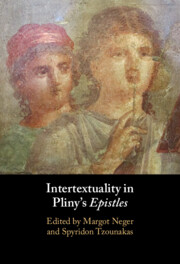Book contents
- Intertextuality in Pliny’s Epistles
- Intertextuality in Pliny’s Epistles
- Copyright page
- Contents
- Contributors
- Acknowledgements
- Abbreviations
- Introduction
- Part I Intertextuality and Interdiscursivity in Pliny’s Letters
- Part II Models and Anti-Models: Pliny’s Interaction with Oratory and Natural History
- Chapter 4 Oratorical Speeches and the Political Elite in the Regulus Cycle
- Chapter 5 Again on Corinthian Bronzes and Vases and on the Use of Cicero’s Verrine Orations in Pliny’s Works
- Chapter 6 The Elder Pliny as Source of Inspiration: Pliny the Younger’s Reception of the Naturalis Historia and His Uncle’s Writing by the Light of a Lamp (lucubratio)
- Part III Pliny and Seneca: Discourses of Grief and Posthumous Reputation
- Part IV Pliny’s Villas and Their Poetic Models
- Part V Pliny Turns Nasty: Satire and the Scoptic Tradition
- Part VI Final Thoughts: Discourses of Representation and Reproduction
- Bibliography
- General Subject Index
- Index Locorum
Chapter 6 - The Elder Pliny as Source of Inspiration: Pliny the Younger’s Reception of the Naturalis Historia and His Uncle’s Writing by the Light of a Lamp (lucubratio)
from Part II - Models and Anti-Models: Pliny’s Interaction with Oratory and Natural History
Published online by Cambridge University Press: 07 September 2023
- Intertextuality in Pliny’s Epistles
- Intertextuality in Pliny’s Epistles
- Copyright page
- Contents
- Contributors
- Acknowledgements
- Abbreviations
- Introduction
- Part I Intertextuality and Interdiscursivity in Pliny’s Letters
- Part II Models and Anti-Models: Pliny’s Interaction with Oratory and Natural History
- Chapter 4 Oratorical Speeches and the Political Elite in the Regulus Cycle
- Chapter 5 Again on Corinthian Bronzes and Vases and on the Use of Cicero’s Verrine Orations in Pliny’s Works
- Chapter 6 The Elder Pliny as Source of Inspiration: Pliny the Younger’s Reception of the Naturalis Historia and His Uncle’s Writing by the Light of a Lamp (lucubratio)
- Part III Pliny and Seneca: Discourses of Grief and Posthumous Reputation
- Part IV Pliny’s Villas and Their Poetic Models
- Part V Pliny Turns Nasty: Satire and the Scoptic Tradition
- Part VI Final Thoughts: Discourses of Representation and Reproduction
- Bibliography
- General Subject Index
- Index Locorum
Summary
This chapter analyses the relationship between the two Plinys by examining how the Younger integrates subjects known from the Elder’s Naturalis Historia in his Epistles. The Younger Pliny adapts the miracle stories to the epistolary genre by selecting individual ones from his uncle’s long lists. One elaborate example replaces scientific completeness and remains in the readers’ mind because of its emotional value for Pliny and the addressee. By presenting the miracles of Italy (a volcanic eruption, dolphins, lakes, and fountains in Ep. 4.30; 6.16; 6.20; 8.20; 9.33) and repeatedly highlighting his close relationship with his hometown Comum, Pliny shows alternatives to the wondrous phenomena of the world described in the Naturalis Historia and thereby distinguishes himself from his uncle. The Younger Pliny also reflects his uncle’s habit of writing at night (lucubratio) and serving the emperor by day. The chapter shows that the Younger Pliny choses his own time of day to write literature and unite the claims of otium and negotium, of leisure and work, which have a different importance for the two Plinys. In doing so, the Younger Pliny also underlines the differences that arise from his senatorial career and his uncle’s military success.
Keywords
- Type
- Chapter
- Information
- Intertextuality in Pliny's Epistles , pp. 129 - 146Publisher: Cambridge University PressPrint publication year: 2023



